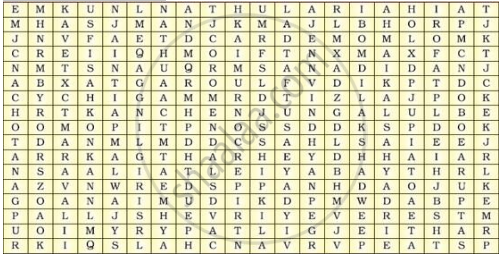Advertisements
Chapters
▶ 2: Physical Features of India
3: Drainage
4: Climate
5: Natural Vegetation and Wildlife
6: Population
![NCERT solutions for Social Science - Contemporary India 1 [English] Class 9 chapter 2 - Physical Features of India NCERT solutions for Social Science - Contemporary India 1 [English] Class 9 chapter 2 - Physical Features of India - Shaalaa.com](/images/social-science-contemporary-india-1-english-class-9_6:3f0f66a1366744a892dcdf6f50bfc25e.jpg)
Advertisements
Solutions for Chapter 2: Physical Features of India
Below listed, you can find solutions for Chapter 2 of CBSE NCERT for Social Science - Contemporary India 1 [English] Class 9.
NCERT solutions for Social Science - Contemporary India 1 [English] Class 9 2 Physical Features of India MCQ [Pages 15 - 16]
Choose the right answer from the alternative given below.
A landmass bound by sea on three sides is referred to as
Coast
Island
Peninsula
None of the above
Choose the right answer from the alternative given below.
Mountain ranges in the eastern part of India forming its boundary with Myanmar are collectively called as
Himachal
Uttarakhand
Purvachal
None of the above
Choose the right answer from the alternative given below.
The western coastal strip, south of Goa is referred to as
Coromandel
Konkan
Kannad
Northern Circar
Choose the right answer from the alternative given below.
The highest peak in the Eastern Ghats is
Anai Mudi
Kanchenjunga
Mahendragiri
Khasi
Answer the following question briefly.
What are tectonic plates?
Answer the following question briefly.
Which continents of today were part of the Gondwana land?
Answer the following question briefly.
What is the bhabar?
Answer the following question briefly .
Name the three major divisions of the Himalayas from north to south.
Answer the following question briefly.
Which plateau lies between the Aravali and the Vindhyan ranges?
Answer the following question briefly.
Name the island group of India having coral origin.
Distinguish between Converging and diverging tectonic plates .
Distinguish between Bhangar and Khadar .
Distinguish between Western Ghats and Eastern Ghats .
Which are the major physiographic divisions of India?
Contrast the relief of the Himalayan region with that of the Peninsular plateau.
Describe how the Himalayas were formed.
Give an account of the Northern Plains of India.
Write short note on the following.
The Indian Desert
Write short note on the following.
The Central Highlands
Write a short note on the following.
The Island groups of India
NCERT solutions for Social Science - Contemporary India 1 [English] Class 9 2 Physical Features of India Map skills [Page 15]
On an outline map of India show the following.
- Mountain and hill ranges – the Karakoram, the Zaskar, the Patkai Bum, the Jaintia, the Vindhya range, the Aravali, and the Cardamom hills.
- Peaks – K2, Kanchenjunga, Nanga Parbat and the Anai Mudi.
- Plateaus, Chotanagpur and Malwa
- The Indian Desert, Western Ghats, Lakshadweep Islands
NCERT solutions for Social Science - Contemporary India 1 [English] Class 9 2 Physical Features of India Project/Activity [Page 16]
Locate the peaks, passes, ranges, plateaus, hills, and duns hidden in the puzzle. Try to find where these features are located. You may start your search horizontally, vertically or diagonally.

Solutions for 2: Physical Features of India
![NCERT solutions for Social Science - Contemporary India 1 [English] Class 9 chapter 2 - Physical Features of India NCERT solutions for Social Science - Contemporary India 1 [English] Class 9 chapter 2 - Physical Features of India - Shaalaa.com](/images/social-science-contemporary-india-1-english-class-9_6:3f0f66a1366744a892dcdf6f50bfc25e.jpg)
NCERT solutions for Social Science - Contemporary India 1 [English] Class 9 chapter 2 - Physical Features of India
Shaalaa.com has the CBSE Mathematics Social Science - Contemporary India 1 [English] Class 9 CBSE solutions in a manner that help students grasp basic concepts better and faster. The detailed, step-by-step solutions will help you understand the concepts better and clarify any confusion. NCERT solutions for Mathematics Social Science - Contemporary India 1 [English] Class 9 CBSE 2 (Physical Features of India) include all questions with answers and detailed explanations. This will clear students' doubts about questions and improve their application skills while preparing for board exams.
Further, we at Shaalaa.com provide such solutions so students can prepare for written exams. NCERT textbook solutions can be a core help for self-study and provide excellent self-help guidance for students.
Concepts covered in Social Science - Contemporary India 1 [English] Class 9 chapter 2 Physical Features of India are The Indian Desert, The Peninsular Indian Plateau, Characteristics of Northern Indian Plains, Physical Divisions of India, The North Indian Mountains, The Himalayas, Purvanchal (Purvachal) Hills, North Indian Plains, The Indian Coastal Plains, The Indian Islands.
Using NCERT Social Science - Contemporary India 1 [English] Class 9 solutions Physical Features of India exercise by students is an easy way to prepare for the exams, as they involve solutions arranged chapter-wise and also page-wise. The questions involved in NCERT Solutions are essential questions that can be asked in the final exam. Maximum CBSE Social Science - Contemporary India 1 [English] Class 9 students prefer NCERT Textbook Solutions to score more in exams.
Get the free view of Chapter 2, Physical Features of India Social Science - Contemporary India 1 [English] Class 9 additional questions for Mathematics Social Science - Contemporary India 1 [English] Class 9 CBSE, and you can use Shaalaa.com to keep it handy for your exam preparation.
